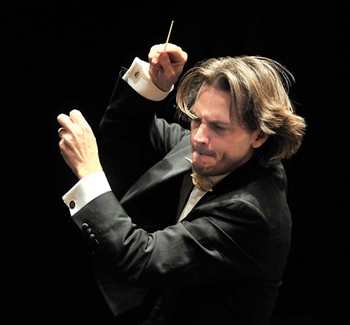by Daniel Hathaway

Too bad, because what might have been an opportunity to hear BlueWater’s 21 string players function as a big chamber music collective — especially in Schoenberg’s thorny Verklärte Nacht — turned into a relatively standard, top-down orchestral concert.
BlueWater began the evening with a tight performance of Mozart’s Serenade in G, aka “Eine kleine Nachtmusik,” a piece that could have played itself without more than an upbeat or two from a leader or conductor.
The middle piece was a rarity — a movement of an unpublished quartet that Dvořák recycled into the slow movement of his second string quintet but then withdrew, arranged for string orchestra, and published separately as his Nocturne in B.
The piece is lovely, beginning with a lulling, 12/8 theme played in octaves by cellos and basses. The music flows into climaxes and ebbs into soft passages before ending with pianississimo chords. The four fermatas that bring forward motion to a halt are tricky to manage however the movement is cued. Meyer and BlueWater negotiated those spots nicely, if a bit cautiously.
Schoenberg’s “Transfigured Night,” based on a five-stanza poem by Richard Dehmel on a theme certain to shock the bourgeois, manages to meld the formal logic of Brahms with the emotionally charged music of Wagner — an outcome neither composer would have contemplated or approved of. Though often performed as a sextet, BlueWater used the composer’s later version for string orchestra.
The piece, 30 minutes in length, is difficult to bring off under the best of circumstances. On Saturday, parts of the score sounded glorious, others tentative as though not all of BlueWater’s excellent players were on the same page — presumably a result of the last-minute change in leadership. And Meyer’s occasionally slashing, angular movements interfered with the lyricism of melodic lines.
It would have been revelatory to hear an interpretation of Verklärte Nacht that came from within the orchestra, even at the expense of some ensemble precision.
Published on ClevelandClassical.com February 5, 2018.
Click here for a printable copy of this article


